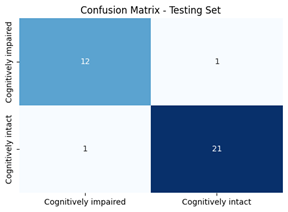Category: Parkinson's Disease: Cognitive functions
Objective: The study aims to develop a supervised machine learning (ML) model to predict long-term cognitive outcome in patients with Parkinson disease (PD).
Background: Cognitive impairment significantly impacts the quality of life for many PD patients. The progression of cognitive decline varies widely among individuals, posing challenges for clinicians in predicting future cognitive status and tailoring interventions accordingly (1, 2).
Method: Baseline T1-weighted MRI data from 114 PD patients were sourced from the Parkinson’s Progression Marker Initiative database (3). Cognitive assessments included the Montreal Cognitive Assessment (MoCA), Hopkins Verbal Learning Test-Revised, Benton Judgment of Line Orientation, Symbol-Digit Modalities Test, Letter-Number Sequencing, and a semantic fluency test. In our previous unsupervised ML study (4), we identified two PD subtypes based on patient-specific imaging markers indicating gray matter volumetric atrophy in specific brain regions. Subtype 1 exhibited greater baseline atrophy in frontal and subcortical regions, correlated with cognitive deficits, particularly in MoCA scores. Subtype 2 displayed less brain atrophy and no cognitive impairment. These imaging markers were utilized to train an artificial neural network model, specifically a multilayer perceptron classifier, where Subtype 1 was labeled as patients with anticipated future cognitive decline, and Subtype 2 as those without impairment. The classifier underwent tuning, and its performance was assessed using accuracy, sensitivity, and specificity on a held-out test set.
Results: The classifier achieved an accuracy of 0.94, sensitivity of 0.91, and specificity of 0.96 in predicting future cognitive status. The performance of the classifier is shown in the confusion matrix (Figure1).
Conclusion: This study successfully developed an ML model capable of predicting future cognitive status in PD patients using baseline MRI data. Further validation in external datasets is necessary to ensure the generalizability and reliability of the developed model across diverse patient populations.
Figure1
References: 1. Roheger M, Kalbe E, Liepelt-Scarfone I. Progression of Cognitive Decline in Parkinson’s Disease. J Parkinsons Dis. 2018;8(2):183-93.
2. Aarsland D, Batzu L, Halliday GM, Geurtsen GJ, Ballard C, Ray Chaudhuri K, et al. Parkinson disease-associated cognitive impairment. Nat Rev Dis Primers. 2021;7(1):47.
3. Marek K, Chowdhury S, Siderowf A, Lasch S, Coffey CS, Caspell-Garcia C, et al. The Parkinson’s progression markers initiative (PPMI) – establishing a PD biomarker cohort. Ann Clin Transl Neurol. 2018;5(12):1460-77.
4. Saadatpour L, Vijayakumari AA, Floden D, Walter B, Fernandez HH. Machine learning at baseline structural MRI predicts rate of cognitive decline in early Parkinson disease. Parkinson Study Group & the Parkinson’s Foundation; Austin, Texas: Movement Disorders; 2023. p. S12.
To cite this abstract in AMA style:
L. Saadatpour, A. Vijayakumari, D. Floden, H. Fernandez, B. Walter. Developing a Supervised Machine Learning Model for Long-Term Cognitive Status Prediction in Parkinson Disease [abstract]. Mov Disord. 2024; 39 (suppl 1). https://www.mdsabstracts.org/abstract/developing-a-supervised-machine-learning-model-for-long-term-cognitive-status-prediction-in-parkinson-disease/. Accessed January 2, 2026.« Back to 2024 International Congress
MDS Abstracts - https://www.mdsabstracts.org/abstract/developing-a-supervised-machine-learning-model-for-long-term-cognitive-status-prediction-in-parkinson-disease/

